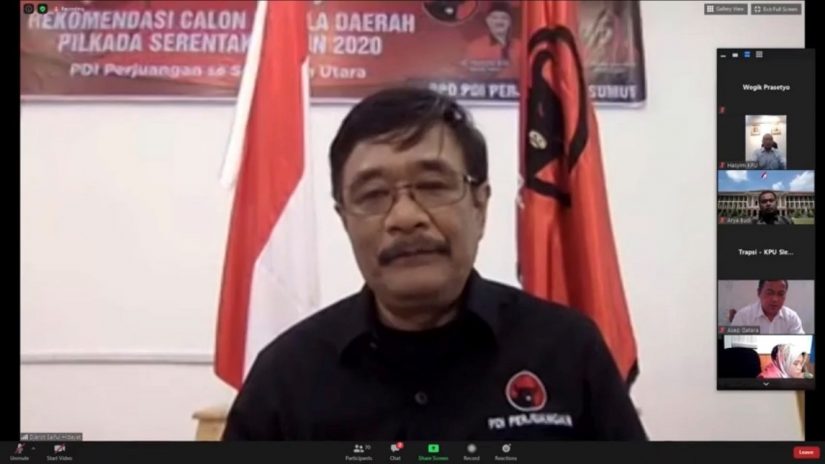
Yogyakarta, July 23rd – Welcoming the arrival of the electoral party at the elections which will be held in December this year, Department of Politics and Government Fisipol UGM held a virtual discussion session called Candidation Process in 2020 Local Elections: A Dark Room Full of Mystery and presented Djarot Saiful Hidayat (Chairperson of the Ideology and Cadre Development of Indonesian Democratic Party of Struggle), Hasyim Asy’ari (Member of General Elections Commission of the Republic of Indonesia), and Arya Budi (Lecturer of Department of Politics and Government Fisipol UGM) as the three main speakers in this discussion. Moderated by Mada Sukmadjati, lecturer of Department of Politics and Government Fisipol UGM, the discussion lasted comprehensively because the speakers not only gave lectures about theories, but also gave an empirical illustration, one of them was Djarot Saiful Hidayat that begun the discussion by explaining about the context of the dynamics of local elections candidation process which have done by Indonesian Democratic Party of Struggle (PDI-P).
As the Chairperson of the Ideology and Cadre Development of Indonesian Democratic Party of Struggle, Djarot explained that in a process of local elections from candidation to candidate winning, his party saw that local elections was a way to build four elements, which the first element was related to build an ideology consolidation. Second, local elections was used as a way to build organization consolidation. It could be seen through the candidation process, when there was a chosen candidate, then it was hoped that the party structure could help to make this candidate win. Third, local elections was a party consolidation and could be a thing to challenge the teamwork of the party to make candidates win. The last, local elections was an important stage to coordinate the party cadres and it hoped to solve the people’s problems. In this case, Djarot also emphasized that the candidation process that had done by PDI-P always used bottom-up method, it also happened to the candidates selection process.
In order to minimize the dark room in candidation process of local elections, PDI-P applied the Candidation Regulation which included in Party Regulation No. 24 year 2017 about the Recruitment of Prospective Regional Heads and Deputy Regional Heads Nominated by PDI-P. Basically, this regulation was about the candidation process that had done by PDI-P consisted by three stages and opened to all people who had integrity and ideology. It continued with document verification and validation of the candidates. Then, there was screening and choosing candidates and it was decided in a plenary meeting. Not only that, PDI-P facilitated those stages by established a party school for the candidates. The goal was to give and increase knowledge related to ideology and share about bureaucratic experiences with the seniors, both from internal and external of the party.
The next speaker was Hasyim Asy’ari. In responding about candidation process in the elections, Hasyim said that political party had an important role in deciding certain positions at the state level. Because, other than its traditional function, political party also had recruitment function. It consisted of two main aspects: selection, which was the internal mechanism of a party where they decide a candidate. Nomination, which also the internal mechanism of a party and marked by the registration of prospective candidates in the General Elections Commission. The explanation of this two main aspects in elections became more interesting when the third speaker, Arya Budi gave his explanation related to several variables of the candidation process in the 2020 local elections.
The first variable was about the survey process that had done by political parties and its difficulties during this pandemic time. Therefore, the access to data validation was more difficult. Because of that, in this local elections, political parties should reconsidered the closeness of the candidates to the parties, their careers, etc. Second, outsiders vs cadres. The second variable was faced by winning logics. Where the outsiders had popularity and it would be a trigger of a dark room, because there was a possibility that it would be a push and pull of interests between cadres and outsiders. Then, there was financing aspect. It was well known that political cost in Indonesia was higher than the integrity of candidates, it could make a destructive political cycle.
System of selection in concurrent setting could also affect the candidation process, negotiation, recruitment, etc. By looking at all those variables, Arya emphasized that candidation process was a part of party’s way to make its candidates win. Arya also explained that survey was a scientific method used by political parties to see how much that survey was congruent with parties’ works. In order to minimize the possibilities of dark room in local elections, Hasyim as the representative of General Elections Commission also said that the General Elections Commission, in a certain limit, had initiated transparency and democratic method of candidation by opening documents of the candidates. This includes participating in publishing campaign funds for researchers and so on.
This interactive discussion was closed by closing statements from the three speakers which generally emphasized that in this local elections candidation process, the institutionalization of Indonesian democracy must be guarded and strengthened, maximize the potency of candidates as the party or public’s domain, and headed to a strong democracy consolidation, and ensured that parties had a healthy and strong soul. Because, to maturing the democracy, Hasyim emphasized that, one of the keys was in a political parties.
